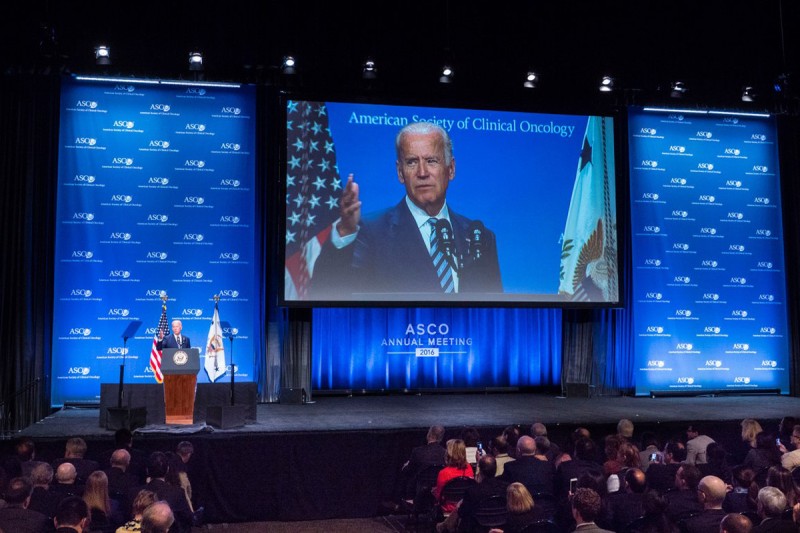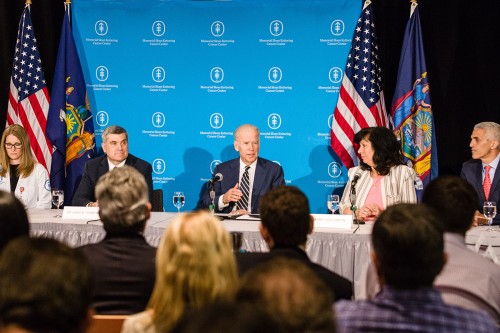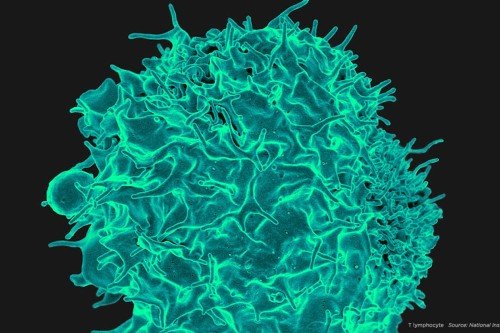
With many Americans now living longer and developing cancer later in life, doctors are increasingly faced with questions about how to best care for these patients. In particular, whether new immune-based medicines will work — safely — in older people is a question that hasn’t been adequately addressed.
At a Monday morning session at ASCO, Memorial Sloan Kettering physician-scientist Claire Friedman discussed results from a retrospective study looking at immunotherapy in people 80 years and older.
The study included 95 patients with advanced melanoma who had received ipilimumab (74 patients); either nivolumab or pembrolizumab (13 patients); or a combination of ipilimumab and nivolumab (eight patients).
For the largest group — those treated with ipilimumab — Dr. Friedman found that older patients had an overall survival rate similar to that of younger patients treated with the same drug: about 20%. The patients were at slightly higher risk for immune-related toxicities, such as diarrhea and colitis, but overall Dr. Friedman said the results suggested that “age is not everything” and that immunotherapy is a good option for these individuals.
Whether elderly patients should receive the combination of ipilimumab and nivolumab — which is associated with more toxicity — is a question that is harder to answer, given the small sample size of that group of patients.
Former president Jimmy Carter’s recent announcement that he is “cancer free” after undergoing treatment for metastatic melanoma brought widespread attention to the topic of immunotherapy for older people. Mr. Carter was treated with the immunotherapy drug pembrolizumab, in addition to surgery and radiation, and appears to have had a complete response, including the disappearance of cancer that had spread to his brain.
Melanoma Clinical Trial Update
In the afternoon on Monday, researchers presented updated results from a large phase III study of the combination of ipilimumab and nivolumab in people with previously untreated advanced melanoma. The clinical trial, led by MSK physician-scientist Jedd Wolchok, contributed to the FDA approval of this combination in 2015.
The main goal of the study, which has three treatment groups, or “arms,” is to determine in a head-to-head manner how this combination of drugs compares with each individual therapy given alone. A secondary focus is to analyze the effect that the expression of a protein called PD-L1 has on the outcome of each therapy.
The results presented yesterday reflect a minimum of 18 months of patient follow-up. The overall response rate was 57.8% for the combo, 43.7% for nivolumab alone, and 19% for ipilimumab alone. These are essentially the same response rates demonstrated earlier in the trial, which means that those who initially responded to the therapy continue to do so. According to Dr. Wolchok, it’s too soon to calculate an overall survival rate for this trial.
What about PD-L1 expression? For patients with low PD-L1 expression in their tumors, the combination seemed to provide clearer benefits over nivolumab alone, whereas for those with higher PD-L1 expression, the two treatments are more comparable — though the combo still appears to have the edge.
“Based on available evidence, the combination of nivolumab and ipilimumab represents a means to improve outcomes versus nivolumab alone,” Dr. Wolchok said. “Additional insights will be gained with the emergence of overall survival data.”
Visit from Vice President Biden

Later in the day on Monday, Vice President Joe Biden visited the ASCO meeting to deliver remarks related to the National Cancer Moonshot Initiative. Mr. Biden stressed familiar themes during the talk — the importance of data sharing among researchers, team science, and improved patient access to clinical trials among them.
But he went further than he has on other occasions, announcing the creation of a new project called the Genetic Data Commons (GDC). Operated by the University of Chicago, the GDC will provide researchers with open access to raw genetic data from any National Cancer Institute–funded study conducted in the United States. Any research group that receives federal funding will be required to release their data to the GDC, Mr. Biden said.
Having previously voiced the opinion that securing privacy of patient data is not a significant hurdle to data sharing, the vice president announced that his team is “working on the consent form” that will allow patients to agree to have their data collected and used in this way.
“This is good news for the fight against cancer,” Mr. Biden said.
In his remarks, the vice president also looked back to the work of cancer pioneerWilliam Coley, a physician at Memorial Hospital (the inpatient hospital of MSK), who developed what is now recognized as one of the first forms of immunotherapy — an area of research and treatment that has skyrocketed to prominence in recent years. MSK continues to be a leader in this field.


